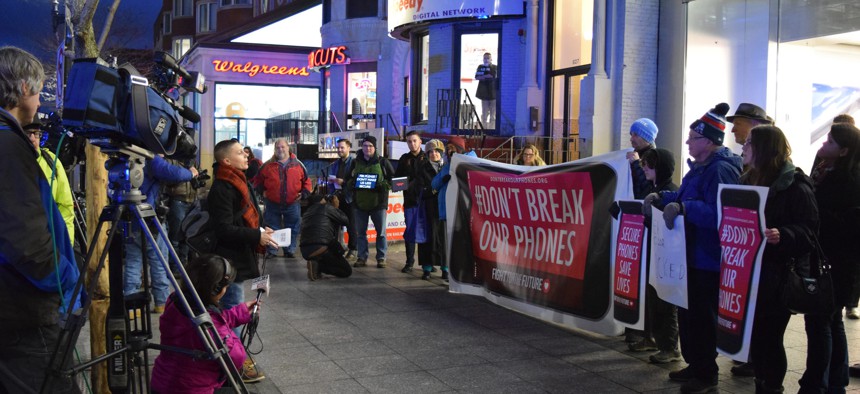
Protestors rallied outside of a Boston Apple Store Tuesday night. Flickr user jamie_okeefe
When You Ask The Public, It Supports Apple Over the FBI — or Does It?
Two polls released this week show seemingly different results.
Two polls; two very different results.
The findings reflect a divisive debate between Apple and the U.S. government over the iPhone 5c that belonged to one of the San Bernardino attackers.
Fifty-one percent of respondents to a Pew Research Center poll, released Monday, said Apple should unlock the iPhone in order to help the FBI. Thirty-eight percent said Apple should not and 11 percent had no opinion.
The telephone survey of 1,002 adults conducted February 18 to 21 had a margin of error of plus-minus 3.7 percentage points. (Methodology here.)
So, it would seem a majority of the public—or close to it—wants Apple to unlock the phone.
Not so fast, according to the results of a national online poll released Wednesday by Reuters/Ipsos. According to that poll, 46 percent said they agreed with Apple’s position, 35 percent said they disagreed, and 20 percent said they did not know. The poll of 1,576 adults, conducted February 19-23, had a margin of error of 3.2 percent. (Methodology here.)
It’s worth pointing out here the two polls differed significantly in one notable manner: the question posed to respondents.
Pew’s pollsters asked:
As you may know, RANDOMIZE: [the FBI has said that accessing the iPhone is an important part of their ongoing investigation into the San Bernardino attacks] while [Apple has said that unlocking the iPhone could compromise the security of other users’ information] do you think Apple [READ; RANDOMIZE]?
Should unlock the iPhone
Should NOT unlock the iPhone
Don’t know/Refused
The Reuters/Ipsos poll, on the other hand, asked:
Apple is opposing a court order to unlock a smart phone that was used by one of the shooters in the San Bernardino attack. Apple is concerned that if it helps the FBI this time, it will be forced to help the government in future cases that may not be linked to national security, opening the door for hackers and potential future data breaches for smartphone users. Do you agree or disagree with Apple’s decision to oppose the court order?
The way in which a poll question is phrased is known to have a significant effect on polling results. The Pew question, which mentioned what the FBI wants and provided less information about Apple’s concerns, could have played a role in how respondents answered that question.
Responses to both polls differed broadly by age group and political affiliation.
In the Reuters poll, Republicans favored the FBI’s position while Democrats took Apple’s side. In the Pew survey, their responses were evenly split, but independent-leaning Republicans supported the government while independent-leaning Democrats backed Apple. The Reuters poll also showed younger Americans were more likely than older ones to agree with Apple’s stand; Pew’s respondents, across age groups, favored Apple unlocking the phone.
As we’ve previously reported, the iPhone in question belonged to Syed Rizwan Farook, who with his wife, Tashfeen Malik, opened fire on December 2, 2015, at a civic-services center in San Bernardino, killing 14 people and wounding 21 others. The attack was believed to be inspired by ISIS, though no direct link has been found between the attackers and the Sunni terrorist group.
Apple says the password on the phone was reset soon after the government took possession of the device (it was reportedly reset accidentally by the San Bernardino Health Department), rendering inaccessible the information the government was seeking. The FBI acknowledged the device was reset, but denied that was significant.
An auto-erase feature is enabled on iPhones if the password is incorrectly entered 10 times. Apple says the FBI wants the ability to unlock the phone using multiple password attempts—a method known as bruteforcing. And last week, a judge ordered Apple to cooperate with the FBI so it could gain access to Farook’s device.
Apple declined. Its CEO, Tim Cook, in a letter to customers, said what the government was seeking was, in essence, a backdoor into the iPhone, which “in the wrong hands … would have the potential to unlock any iPhone in someone’s physical possession.” That position has broad support in the tech industry—with anotable exception.
But the Justice Department, in response, filed a motion to compel Apple to comply with the judge’s order. And it rejected the idea it was seeking a “backdoor” into the iPhone and noted the judge’s order pertains only to Farook’s iPhone—though that device is one of at least a dozen iPhones the FBI is seeking to access; those cases do not involve terrorism.
James Comey, the FBI chief, wrote this week the litigation against Apple “is about victims and justice.” He appeared to have support from the CIA.
Apple’s lawyers, who are expected to file the company’s formal response to the judge’s order by Friday, are reportedly considering using its First Amendment rights to decline cooperating with the FBI.
(Image via Flickr user jamie_okeefe)






